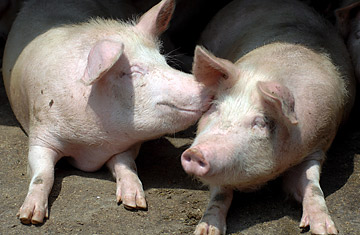
Interstate 980 cuts through a gritty section of West Oakland, California, bisecting a neighborhood blighted by abandoned homes and open drug-dealing. It's also home to a bustling farm that's been feeding writer Novella Carpenter and her neighbors for six years. An energetic advocate of sustainable, do-it-yourself living, Carpenter has raised (and slaughtered) chickens, ducks, geese, goats and even pigs in what was formerly a garbage-strewn lot next to her home. She recently published a memoir, Farm City: The Education of an Urban Farmer, and spoke with TIME about her unlikely adventure in living off the land.
How did your neighbors react to having a farm sprout up in their midst?
Most of my neighbors are from cities in Vietnam, where people are actively urban farming. For them it's pretty normal, though at one point I had too many chickens and they sort of overran the neighborhood. A lot of the neighborhood kids are pretty excited to see farm animals, something they would never normally get to do.
Your parents were hippies who left northern California to be closer to nature in rural Idaho. It seems like you've embraced the "nature" component of their mission, but not the "rural" part.
I love the ideals of my parents — going back to the land to grow their own food and raise children. The problem is that rural areas can be very lonely, isolating places. There's not necessarily a sense of community. In the city, people all have different backgrounds and they can share that information and wisdom. The owner of a liquor store down the street used to be a goat farmer in Yemen; I can run down and say, "Hey, does my goat look okay?"
So what you're doing fuses the advantages of rural and urban living.
That's what I try to do. There are definitely pitfalls. When I had two pigs in my backyard, of course there were issues with the smell. Maybe I took it a little too far in that instance. But for the most part it tends to be a pretty happy experience.
Your farm is more than just a petting zoo. You kill and eat your animals, sometimes after naming them and posting cute photos on your blog. Is it hard to kill animals you've raised?
The minute you start raising these animals it's with the idea that you're going to eat them. That's why I've been giving them such a good life — so they can die and make incredibly tasty meat. It's not like I just encountered my pigs one day and then killed them.
Pigs eat a lot, and you had to work hard to keep them fed. You and your boyfriend mapped all the best Dumpsters in the area, and dived right into them for food.
We figured out that restaurants are the best bet because there's cooked food in the Dumpster, and pigs prefer cooked food. I don't really want to cook for a pig, so it's perfect. We were exhausted by the end, but when you're eating your pork chops or your bacon — recently we just cut open the prosciutto which had been hanging for 18 months — it's totally worth it.
If your pigs eat well, then you do too.
Exactly.
You have a lot going on besides farming and growing food. Recently you've been tanning animal hides and now you're building your own outhouse. What motivates you to do this? Is it environmental? Political?
I wish I could say I was doing it for environmental reasons or political reasons. But that rhetoric makes it sound like I do it for a self-righteous reason, and I hate that, it's so alienating. I've just chosen this because I really love animals and I'm really interested in biology and the natural world. I can't change the world, but at least I can change what's on my plate, in a way that doesn't cost a lot of money.
Is this way of living permanent for you?
Yes. It's never been a stunt for me. The first thing I bought when I got my book advance was a milk goat, because I had always wanted to have one. It's so wonderful to have the animals around, especially now when I'm having these [book] events and it can be kind of stressful. I come home and the goats don't think anything of it. I find it very soothing.
How has the reaction been to your book?
It's been amazing. I keep thinking that the PETA people are going to come kick my butt, but they haven't so far. I think they realize that doing what I do would probably reduce people's meat consumption. If people are going to raise their own meat and kill it, they're going to see it shouldn't just be a casual dalliance. It should be pretty special.
